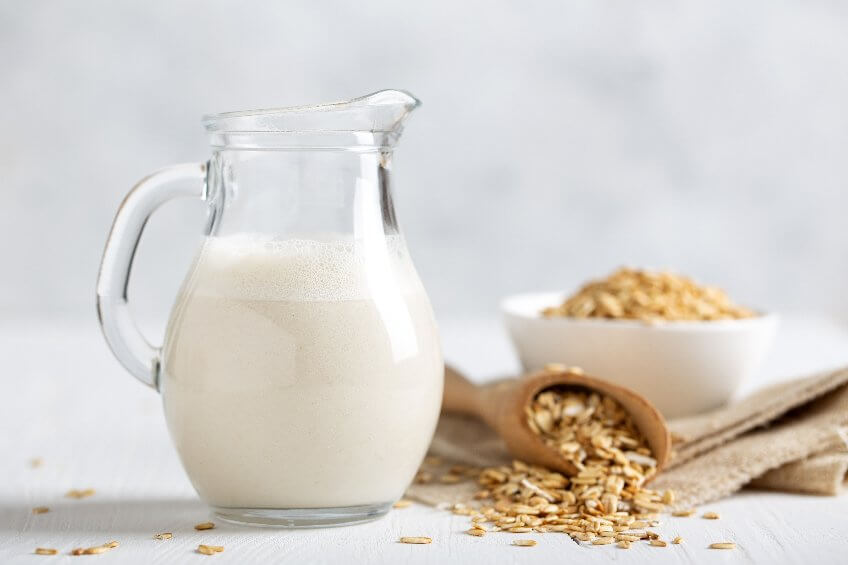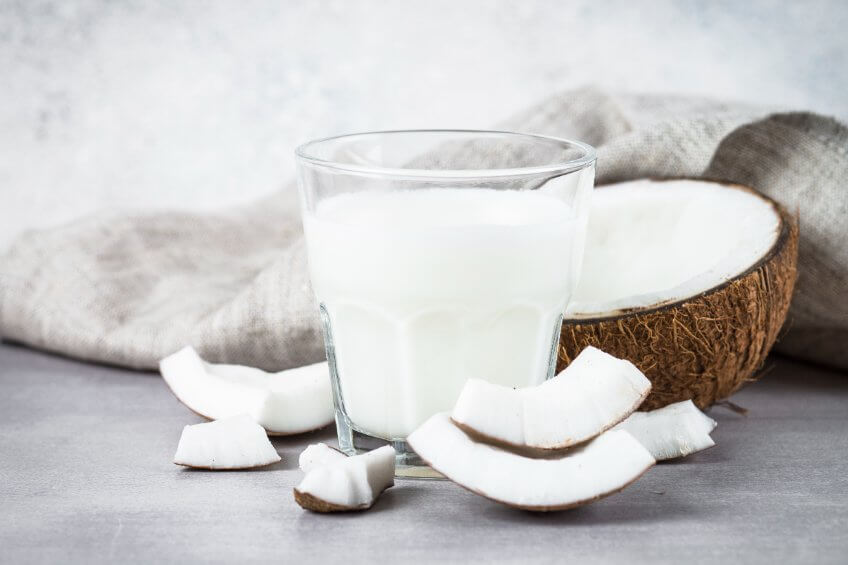Whether it be plant-based or otherwise, there’s no shortage of milk varieties and alternatives on the market, and choosing between them can be overwhelming if you don’t know what to look for. Two such options would be oak milk and coconut milk, which are plant-based milk alternatives that can serve as a replacement for cow-based dairy milk. If you’ve ever wondered how the two compare nutritionally (and every other way) then you’re in luck as today we will be doing a comprehensive overview of oat milk vs coconut milk.
In short, the difference between oat milk vs coconut milk is that oat milk contains less saturated fat, more fiber, and more protein. Coconut milk, however, contains fewer calories, less carbohydrates (making it keto-friendly,) and more vitamins and minerals.
That said, there are additional differences you may want to consider when choosing between the two. Let’s have a closer look.
What Is Oat Milk?
Oat milk is a plant-based alternative to cow’s milk that is made from crushed oats that have been blended with water and filtered to remove the oat bran. Enzymes may be added to help break the starch down further.

The main selling point of oat milk is that, unlike dairy milk, it does not contain lactose, cholesterol, or high amounts of saturated fat. It has gained in popularity in recent years, becoming a staple in coffee shops and cafes.
How It’s Used
The uses for oat milk are countless. However, it is most commonly used in coffee and tea as a creamer. The plant-based nature of oat milk makes it a good alternative for vegans, vegetarians, or anyone who may be looking for a more nutritious alternative to whole milk.
One of the biggest differences between oat milk vs coconut milk is that the oat variety works better for steaming and frothing, making it ideal for use in espressos. This is a rare trait among plant-based milk options as very few can froth as well as regular milk does.
Additionally, oat milk can be used in oatmeal, cereal, or enjoyed on its own as a beverage.
How It Tastes
Another consideration you may make when choosing between oat milk and coconut milk is their flavor.
Flavor can vary by brand, but for the sake of this comparison we will be focusing on the Califia Farms brand of oat milk, which is the most-reviewed oat milk product on Amazon.com.
According to reviews, oat milk has a creamy consistency that is consistent with whole milk, but it also has somewhat of an earthy, nutty flavor.
Ingredients
The ingredients used to make oat milk can also vary by brand, by the Califia Farms brand contains:
- Oatmilk (water, oats)
- Sunflower oil
- Dipotassium Phosphate
- Calcium Carbonate
- Tricalcium Phosphate
- Sea salt
Storage & Shelf Life
The shelf life of oat milk is determined by its processing. However, the brand surveyed for this comparison has a shelf life of 6 months.
Furthermore, oat milk does not need to be refrigerated before it is opened. Once it is opened, however, refrigeration is recommended– preferably within 2 hours, according to the USDA.
How About Coconut Milk?
Now let’s have a closer look at the coconut-based variety of milk.

Coconut milk is made by pressing the flesh of mature coconuts to extract their milk. Much like oat milk, it too is a popular plant-based alternative to cow’s milk and can be used in many of the same ways.
How It’s Used
Coconut milk can be used in the following ways:
- Added to smoothies
- Added to oatmeal and cereal
- Used as an alternative to dairy milk in recipes
- Used to make ice cream
- And more
In short, coconut milk can be used in virtually every way that dairy milk can be used. And thanks to its fat content, it too froths better than most other plant-based milks (though not as well as oat milk!)
How It Tastes
Coconut milk has a slightly sweet flavor with a coconut aroma. The consistency is also creamy but thinner than oat milk or cow’s milk. It’s also not as sweet as oat milk due to the sugar content of the latter.
As one reviewer pointed out, the coconut flavor is mild and not as intense as coconut water and similar beverages that are canned.
Ingredients
Another big difference between oat milk vs coconut milk is the ingredients list, with coconut milk having far more ingredients.
The ingredients in coconut milk can vary by brand, but the main ingredient is always coconuts or coconut cream mixed with water. Vitamins and minerals are also added.
Storage & Shelf Life
According to the “Does It Go Bad?” website, both canned and carton varieties of coconut milk must be refrigerated after opening. Once opened, they can last between 5-10 days.
Furthermore, if the product was refrigerated when you purchased it then you should ensure that it remains refrigerated.
Oat Milk VS Coconut Milk: Nutritional Differences
Now that we’ve gone over some of the practical differences between oak milk and coconut milk, let’s have a look at how they compare nutritionally.
Nutrition Facts Labels
The table below compares the nutrition facts of a 1-cup serving of oat milk versus an equal serving size of coconut milk:
| Item | Oat Milk | Coconut Milk |
| Serving Size | 1 cup | 1 cup |
| Calories | 130 | 40 |
| Total Fat | 7g | 4g |
| Saturated Fat | 0.5g | 4g |
| Cholesterol | 0mg | 0mg |
| Total Carbohydrate | 14g | 2g |
| Dietary Fiber | 2g | 0g |
| Total Sugars | 3g | 0g |
| Protein | 1g | 0g |
| Sodium | 110mg | 45mg |
| Potassium | 380mg | 310mg |
| Vitamin A | N/A | 20% DV |
| Vitamin B12 | N/A | 35% DV |
| Vitamin D | 0% DV | 10% DV |
| Calcium | 15% DV | 35% DV |
| Iron | 0% DV | 2% DV |
Each milk variety has certain traits in common, including:
- They’re both lactose-free
- Neither contains dairy, making them ideal for vegans and vegetarians
- Neither contains dietary cholesterol
That said, oak milk and coconut milk share more nutritional differences than commonalities. Let’s elaborate.
Oat Milk Contains Less Saturated Fat
Possibly the greatest nutritional advantage that oak milk has over coconut milk is that it contains far less saturated fat.
Saturated fat, according to the American Heart Association (AHA), is a “bad” type of fat that is solid at room temperature and may increase LDL cholesterol levels. The AHA recommends getting no more than 6% of your calories from saturated fat, which would be roughly 13 grams per day on a 2,000-calorie diet.
One of the main reasons why some consumers switch from dairy milk to plant-based milks is due to the saturated fat content. However, coconut milk contains just as much saturated fat per serving as whole-fat dairy milk does, clocking in at 4 grams per 1-cup serving.
Oat milk, on the other hand, only contains 0.5 grams per cup.
Oat Milk Also Contains Fiber
Another consideration to make when choosing between oat milk vs coconut milk is fiber content.
Fiber is an indigestible form of carbohydrate that can lower cholesterol levels, improve bowel health, and help manage blood sugar levels according to Mayo Clinic.
When opting for oat milk you will benefit from the 2 grams of fiber for every cup. Coconut milk, on the other hand, contains none.
Oat Milk Has More Protein
As you may already know, cow-based dairy milk is quite high in protein. One of the most difficult challenges when switching from dairy milk to a plant-based milk is making up for all the lost protein.
If protein is of importance to you then truthfully, neither oat milk nor coconut milk is ideal as they do not contain a significant amount of it. That said, oat milk does have a slight advantage here with 1 gram of protein per cup. Coconut milk contains none.
Coconut Milk Contains Fewer Calories
Now let’s have a look at some of the advantages you’ll enjoy when opting for coconut milk over oak milk, starting with calorie content.
Calories are the unit of measurement that we use to track the energy we consume and expend. According to Mayo Clinic, a calorie deficit is required for weight loss to occur. This means foods that are lower in calories will give you an advantage as they allow you to consume a greater volume of food for less energy.
If calorie conservation is your priority then coconut milk is the clear winner here as it contains less than a third of the calories of oat milk, clocking in at 40 and 130 calories respectively.
Coconut Milk Contains Less Carbohydrates
Another consideration to make when choosing between the two is their carbohydrate content. As it turns out, coconut milk contains far less carbs, clocking in at a meager 2 grams per cup, whereas oat milk contains 14 grams for the same serving size.
Furthermore, coconut milk contains no sugar, whereas oat milk has 3 grams of sugar per serving.
This means that coconut milk would be preferable when following a ketogenic (or “keto“) diet– a diet characterized by restricting carbohydrate intake in favor of fat and protein calories.
If you plan on following a keto diet then the choice between oat milk vs coconut milk should be quite an easy one.
Coconut Milk Is Higher In Vitamins & Minerals
Finally, coconut has the advantage of packing more vitamins & minerals per serving, including:
- Vitamin A, also known as retinol, plays a role in eye health.
- Vitamin B12, which is produced by bacteria and helps keep nerve cells healthy.
- Vitamin D, which helps the body absorb calcium.
- Calcium, an essential mineral and electrolyte that helps build strong bones.
- Iron, which helps transport oxygen through the blood.
Coconut flesh can be rich in vitamins and minerals, but many of those found in coconut milk come from fortification.
The Bottom Line
In conclusion, the differences between oat milk vs coconut milk are many, and this is a decision that requires much consideration of them.
On one hand, oat milk has a longer shelf life and would be preferable for those looking to cut back on saturated fat and add more fiber to their diets. Coconut milk, on the other hand, would be the ideal choice for those seeking the lowest-calorie option that is also keto-friendly.
Whichever you choose, you can’t go wrong. Drink up!

